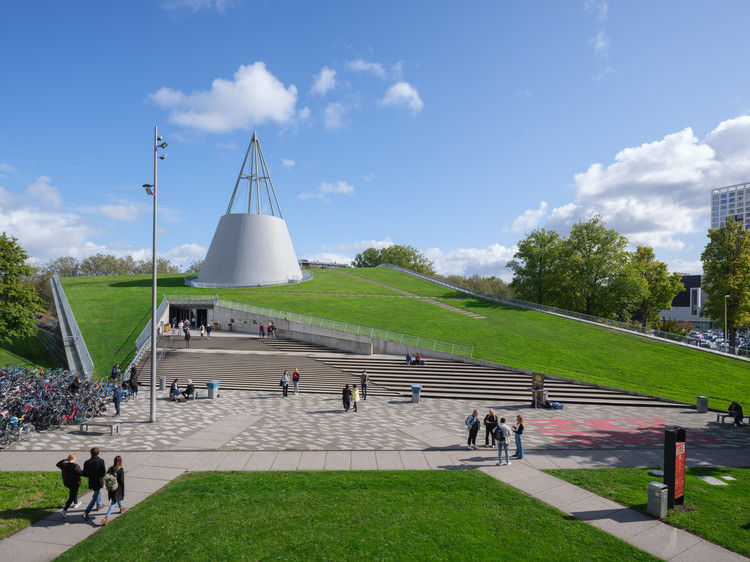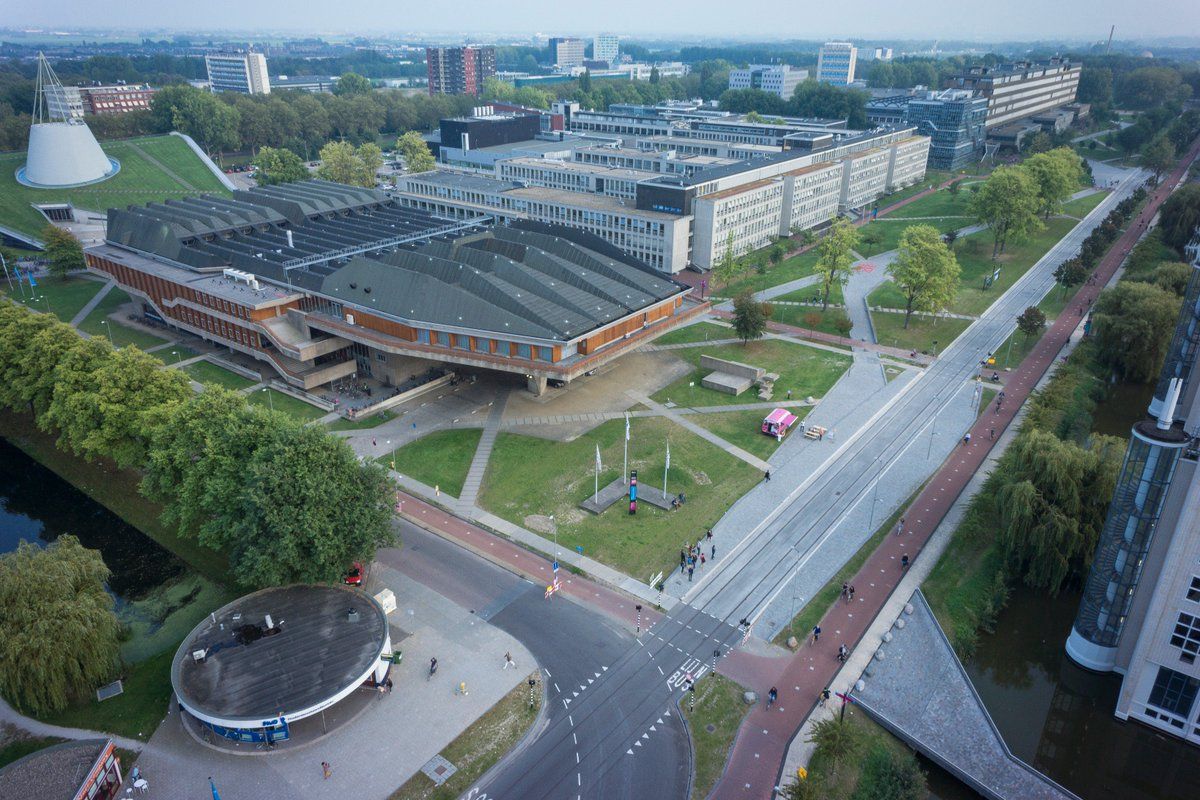According to the Times Higher Education University Rankings 2022, it ranks in the top 75 globally, top 24 in Europe, and top 6 in the Netherlands. Additionally, the Shanghai University Rankings 2022 (ARWU) recognizes the university as one of the top 155 institutes in the world.
The university enjoys a successful subject ranking tally as well. Based on QS World University Rankings 2022, the Civil & Structural Engineering course ranks as the best program provided by any institute in the same category in Europe.
On the other hand, ARWU Rankings 2022 position the university’s Transportation and Aerospace Engineering programs among the top courses in the specialization provided by any European university.
Infrastructure at Delft University of Technology
The campus extends over an area of 161 hectares, which is greater than downtown Delft itself, making it one of the biggest engineering and technology universities in the world.
Here’s an overview of the several campus facilities present at the university.
- TU Delft Aula- Inaugurated in 1966, the Aula is a Brutalist-style building that acts as a symbolic entrance to Mekelpark. Additionally, it possesses several restaurants, stores, lecture halls, auditoriums, administrative offices, and a congress centre.
- TU Delft Library- Located behind the Aula, the library’s roof is covered with grass to act as natural insulation. The building contains an inclined staircase on one end to allow students to walk on top of it, while the conical steel structure on the top offers it a unique shape. It also houses the TU Center for Research Data.
- Cultural and Sports Center- It’s situated in Mekelweg 10, at the corner of the Mekelpark. Since being open to students and staff in 1995, it has undergone numerous expansions and renovations.
- TU Delft Musea- The three musea of the university are the Science Center Delft, Mineralogy & Geology Museum, and Beijerinck en Kluyver archive.
- Science Center Delft- Started in September 2010 and established at Mijnbouwstraat 120 in Delft, the centre aims to present the developments in technology to a larger audience. It exhibits the various research projects carried out by TU Delft teams such as Eco Runner and Nuna.
- Mineralogy & Geology Museum- A branch of the TU Delft Faculty of Civil Engineering and Geosciences, it consists of around 2,00,000 ancient mineralogical, geological, and crystallographic objects divided further into sub-collections.
- TU Delft Botanical Garden- Dating back to 1917, the Delft Botanical Garden boasts approximately 7000 species of plants, such as sub-tropical and tropical, herbs, and ornamental plants.
Academics at Delft University of Technology
The Delft University of Technology invites applications from Non-EU/EFTA students for the September 2022 batch from 15th January 2022.
Although there are other application windows starting from 1st April 2022 and 1st May 2022 for the same batch, they’re only accessible by EU/EFTA students or graduates possessing an internationally recognized Dutch degree.
The next application window for Indian students will begin on 1st December 2022 for the February 2023 batch.
Admission Process at Delft University of Technology
To enrol in the university, students need to follow the given Delft University of Technology admission process:
- To apply for BSc programs, students need to apply through TU Studielink. They need to fill out their personal details and choose to apply to the university for a full-time program.
- Subsequently, they’ll receive an email from TU Delft possessing their NetID, email address, and an invitation to the Osiaan portal. Students need to activate their NetID to log onto all TU Delft systems and upload their passport photos at the designated link.
- Next, applicants need to complete their application on the Osiaan portal and pay an application fee of EUR 100. It’s advisable to check the progress of the application regularly.
- Shortlisted candidates will receive a request by March to visit the TU Delft campus for a physical document verification once TU Studielink the status changes to enrol.
- The procedure to apply and application fees for MSc programs is precisely the same. However, the only significant difference is instead of selecting Bachelors during their online application; they need to opt for Masters.
- It’s essential to note that each applicant can only opt for a single BSc or MSc program while applying. Nevertheless, if students wish to go for a Numerus Clauses program, they can select one backup course as well.
Admission Requirements for Delft University of Technology
Following are the Delft University of Technology admission requirements:
- For Indian students to enrol in the university, there are specific requirements, including a secondary school diploma, study of particular school subjects, and language requirements.
- Firstly, students require a Standard XII (Academic Stream) All India Senior School Certificate issued by either CBSE or CISCE with a score of 75% or above in 5 individual subjects.
- Students also need to have undertaken certain obligatory AISSCE examination subjects to be eligible for certain BSc courses at the university.
Here is the table providing a clear overview of the BSc admission requisites.
| BSc Program |
Subject Requirement |
| Aerospace Engineering (English) |
Mathematics + Physics |
| Applied Earth Sciences (English) |
Mathematics + Physics + Chemistry |
| Computer Science and Engineering (English) |
Mathematics |
| Nanobiology (English) |
Mathematics + Physics + Biology + Chemistry |
- Applicants enrolling in English programs don’t require any kind of Dutch proficiency. However, there are English proficiency requirements such as a TOEFL iBT with an overall band score of at least 90, IELTS (academic version) with an overall band score of at least 6.5, C1 Advanced (Certificate of Advanced English) with an overall score of at least 176, or C2 Proficiency (Certificate of Proficiency in English) with an overall score of at least 180.
- To enrol in MSc programs, applicants require a Bachelor’s degree with a Cumulative Grade Point Average (CGPA) of at least 75% of the scale maximum.
- They also need to meet certain strict English language proficiency demands, including a TOEFL iBT with an overall band score of at least 90 and a minimum score of 21 for each section, an IELTS (academic version) with an overall Band score of at least 6.5 and a minimum of 6.0 for each section, C1 Advanced (Certificate of Advanced English) with an overall score of 176 and a minimum of 169 for each section, or C2 Proficiency (Certificate of Proficiency in English) with an overall score of 180 and a minimum of 169 for each section.
The Delft University of Technology acceptance rate revolves around 60-70%. Furthermore, it depends on the program students are applying for. BSc programs tend to have a better acceptance rate than most MSc programs.
Courses Offered at Delft University of Technology
The university offers an exceptionally selective 16 undergraduate courses and 59 post-graduate courses in research, engineering, and technology.
BSc Programs
Following are a few well-known undergraduate courses or BSc programs offered by the university:
- Aerospace Engineering
- Applied Earth Sciences
- Applied Mathematics
- Applied Physics
- Architecture Urbanism and Building Sciences
- Clinical Technology
- Life Science and Technology
- Marine Technology
- Molecular Science and Technology
- Systems Engineering, Policy Analysis and Management
MSc Programs
The list of a few MSc programs provided by the university includes:
- Applied Geophysics
- Biomedical Engineering
- Complex System Engineering and Management
- Design for Interaction
- Embedded Systems
- Environmental Engineering
- European Wind Energy
- Geomatics
- Industrial Ecology
- Offshore and Dredging Engineering
- Technical Medicine
Delft University of Technology, Netherlands follows the European Credits Transfer System (ECTS). A single academic year is equivalent to 60 European Credits (EC), and one EC is equivalent to 28 hours of academic involvement and study. BSc programs consist of 180 EC in total, while MSc programs comprise 120 EC.
The crucial term dates for the 2022-23 academic year are the following:
- First Semester Period One- August 2022 to October 2022
- First Semester Period Two- November 2022 to January 2023
- Second Semester Period Three- February 2023 to April 2023
- Second Semester Period Four- May 2023 to July 2023
Extracurriculars and Diversity at Delft University of Technology
Although the university believes in providing students with an enjoyable campus experience by elevating standards of research and study, there’s no shortage of students associations.
Most student associations revolve around the idea of deriving fun through academics. As a result, students can expect to find the following types of student associations on the campus:
- LIFE- The student organization of Life Science and Technology
- InterSECtion- The study association of Science Education and Communication
- S.V.N.B. Hooke- The study association of Nanobiology
- Technologisch Gezelschap (TG)- The student organization of Molecular Science & Technology en Chemical Engineering
- Vereniging Voor Technische Physica (VvTP)- The student organization of Applied Physics
Apart from research-based clubs, the university is also home to a massive sports facility known as X. Previously, it was widely known as the Cultural and Sports Center.
Career/Professional at Delft University of Technology
The Delft University of Technology offers numerous services to help its graduates establish promising professional careers. Individuals in the first year of their graduation can use these services free of charge.
However, individuals belonging to the range of 2nd to 5th year of their graduation need to pay a fee of EUR 30 to avail of career support services such as one-on-one coaching under a career center professional.
The three primary benefits of career support are:
- One-on-one Coaching
- Career Workshops (EUR 20 per workshop)
- Membership to the TU Delft Your Career Portal
Also, the university boasts several placement and recruitment programs to help students secure jobs in various well-established companies like:
- Shell
- Siemens
- BMW
- Philips
- TNO
- Ferrari
- NASA
- KLM
- Schiphol
- Boeing
- McKinsey & Company
- Boston Consulting Group
- ING
- Goldman Sachs
- BAM
- Dura Vermeer
- European Space Agency (ESA)
- Directorate-General for Public Works and Water Management
- Netherlands Organization for Applied Scientific Research (TNO)
Popular Alumni of Delft University of Technology
The university also boasts a long list of successful and well-settled alumni. Take a look at a few of those renowned names.
- Ben van Beurden: CEO of Royal Dutch Shell
- Laurens van den Acker: Dutch Automobile Designer and Vice President of Renault Corporate Design
- Jacob Pieter Den Hartog: Dutch Mechanical Engineer, recipient of the Timoshenko Medal
- Willem Alberda van Ekenstein: Discoverer of Lobry de Bruyn–van Ekenstein Transformation
- Harry Droog: Dutch Rower, Olympic medalist
- Abdul Qadeer Khan: Pakistani Nuclear Scientist, Metallurgical Engineer, known as the “Father of the Islamic nuclear bomb”
- Peter Newman: Australian Environmental Scientist
Financial at Delft University of Technology
The cost of living is a vital expense for any student pursuing academics in the Netherlands. The costs in this country are lower compared to the UK, but a few cities, including Amsterdam, are quite expensive.
Typically, the cost of living in the Netherlands will incur students around EUR 700 per month. This figure includes accommodation, food, study materials, insurance, clothes, and entertainment.
The tuition fees for international applicants depend on the seniority of the program students opt for. Following is an overview of the Delft University of Technology fees for the academic year 2022-23.
| 2022-23 |
BSc Courses |
MSc Courses |
| Tuition Fees |
EUR 15,200 |
EUR 19,600 |
| Living Cost |
EUR 11,950 |
EUR 11,950 |
| Visa Fee |
EUR 215 |
EUR 215 |
| TU Delft Housing Fee |
EUR 285 (INR 24,000) |
EUR 285 |
| Total |
EUR 27,150 |
EUR 31,550 |





















